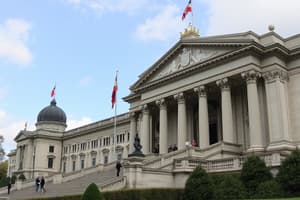Podcast
Questions and Answers
What must the Court determine regarding the rights claimed by a party at the initial stage of the proceedings?
What must the Court determine regarding the rights claimed by a party at the initial stage of the proceedings?
- Whether the rights have been acknowledged by the other party
- Whether the rights are definitively established
- Whether the rights can be protected in any form
- Whether the rights claimed are plausible (correct)
Which of the following is NOT a requirement for provisional measures?
Which of the following is NOT a requirement for provisional measures?
- Non-aggravation of the dispute
- Real and imminent risk
- Definitive proof of rights (correct)
- Link between measures and rights
What is one of the functions of counterclaims as described in the content?
What is one of the functions of counterclaims as described in the content?
- To widen the subject-matter of the dispute (correct)
- To directly dismiss the claim of the other party
- To limit the jurisdiction of the Court
- To defend against the original claims
In the context of third-party intervention, what does Article 63 affirm?
In the context of third-party intervention, what does Article 63 affirm?
What establishes the connection in fact for counter-claims?
What establishes the connection in fact for counter-claims?
What is the primary legal obligation outlined in Article 94 of the UN Charter?
What is the primary legal obligation outlined in Article 94 of the UN Charter?
What is the primary focus of provisional measures in a case?
What is the primary focus of provisional measures in a case?
Which statement accurately reflects the concept of res judicata in the context of the Court's decisions?
Which statement accurately reflects the concept of res judicata in the context of the Court's decisions?
What distinguishes a counterclaim from a defense in court procedures?
What distinguishes a counterclaim from a defense in court procedures?
Which statement correctly describes the concept of 'prima facie jurisdiction'?
Which statement correctly describes the concept of 'prima facie jurisdiction'?
What does the implementation of a judgment often require?
What does the implementation of a judgment often require?
What does the urgency requirement suggest in the context of provisional measures?
What does the urgency requirement suggest in the context of provisional measures?
What factor can potentially influence the enforcement of a judgment by the parties involved?
What factor can potentially influence the enforcement of a judgment by the parties involved?
What must be specified in the application for contentious cases?
What must be specified in the application for contentious cases?
Who can raise preliminary objections according to Article 79 of the Rules of Court?
Who can raise preliminary objections according to Article 79 of the Rules of Court?
What is the maximum time frame for a party to raise preliminary objections?
What is the maximum time frame for a party to raise preliminary objections?
What characterizes the written proceedings in contentious cases?
What characterizes the written proceedings in contentious cases?
Which article specifies the Court's power to indicate provisional measures?
Which article specifies the Court's power to indicate provisional measures?
What could a preliminary objection pertain to according to general admissibility questions?
What could a preliminary objection pertain to according to general admissibility questions?
In contentious cases, which of the following languages are allowed for submissions?
In contentious cases, which of the following languages are allowed for submissions?
What happens to the proceedings when a preliminary objection is raised?
What happens to the proceedings when a preliminary objection is raised?
Which of the following terms describes the Court's power to preserve rights through provisional measures?
Which of the following terms describes the Court's power to preserve rights through provisional measures?
What does Article 36 of the ICJ Statute address regarding disputes?
What does Article 36 of the ICJ Statute address regarding disputes?
What is meant by 'Jurisdiction Ratione Materiae' in the context of disputes?
What is meant by 'Jurisdiction Ratione Materiae' in the context of disputes?
Which of the following statements best describes the concept of 'dispute'?
Which of the following statements best describes the concept of 'dispute'?
What does the Monetary Gold Principle state about the admissibility of cases?
What does the Monetary Gold Principle state about the admissibility of cases?
What was a significant outcome of the Nicaragua v United States case?
What was a significant outcome of the Nicaragua v United States case?
Which of the following best illustrates the term 'preliminary objections' in the ICJ context?
Which of the following best illustrates the term 'preliminary objections' in the ICJ context?
What is the core principle guiding the interpretation of treaties regarding state responsibility?
What is the core principle guiding the interpretation of treaties regarding state responsibility?
In which case were third parties like Indonesia considered in relation to self-determination rights?
In which case were third parties like Indonesia considered in relation to self-determination rights?
What are 'surprise attacks' in the context of jurisdiction?
What are 'surprise attacks' in the context of jurisdiction?
How does Article 36.2 of the ICJ Statute define the acceptance of jurisdiction?
How does Article 36.2 of the ICJ Statute define the acceptance of jurisdiction?
The term 'jurisdiction ratione consensus' in ICJ context refers to what?
The term 'jurisdiction ratione consensus' in ICJ context refers to what?
Flashcards
Provisional Measures
Provisional Measures
Temporary measures ordered by an international court to protect rights during legal proceedings.
Prima Facie Jurisdiction
Prima Facie Jurisdiction
Apparent jurisdiction; initial impression of legal authority.
Plausibility (in Court)
Plausibility (in Court)
Reasonable likelihood of success in a legal case.
Irreparable Prejudice (Pulp Mills)
Irreparable Prejudice (Pulp Mills)
Signup and view all the flashcards
Intervention (Third States)
Intervention (Third States)
Signup and view all the flashcards
Counter-Claim
Counter-Claim
Signup and view all the flashcards
Consecutive requirements of counter-claim
Consecutive requirements of counter-claim
Signup and view all the flashcards
Counter-claim is not a defense
Counter-claim is not a defense
Signup and view all the flashcards
Application in Contentious Cases
Application in Contentious Cases
Signup and view all the flashcards
Jurisdictional Grounds
Jurisdictional Grounds
Signup and view all the flashcards
What must the Application include?
What must the Application include?
Signup and view all the flashcards
Written Proceedings
Written Proceedings
Signup and view all the flashcards
Preliminary Objections
Preliminary Objections
Signup and view all the flashcards
Admissibility
Admissibility
Signup and view all the flashcards
Intervention
Intervention
Signup and view all the flashcards
Special Reference
Special Reference
Signup and view all the flashcards
Counter-claim connection in fact
Counter-claim connection in fact
Signup and view all the flashcards
Counter-claim connection in law
Counter-claim connection in law
Signup and view all the flashcards
Jurisdiction in counter-claims
Jurisdiction in counter-claims
Signup and view all the flashcards
Art. 94 UNCh: Obligation to comply
Art. 94 UNCh: Obligation to comply
Signup and view all the flashcards
Art. 59 of the Statute: Res judicata
Art. 59 of the Statute: Res judicata
Signup and view all the flashcards
Compromissory Clause
Compromissory Clause
Signup and view all the flashcards
Jurisdiction Ratione Consensus
Jurisdiction Ratione Consensus
Signup and view all the flashcards
Jurisdiction Ratione Materiae
Jurisdiction Ratione Materiae
Signup and view all the flashcards
Optional Clause Declarations
Optional Clause Declarations
Signup and view all the flashcards
Monetary Gold Principle
Monetary Gold Principle
Signup and view all the flashcards
Dispute
Dispute
Signup and view all the flashcards
Third Parties in ICJ Cases
Third Parties in ICJ Cases
Signup and view all the flashcards
Interconnectedness of Legal Issues
Interconnectedness of Legal Issues
Signup and view all the flashcards
Legal Situation of Third Parties
Legal Situation of Third Parties
Signup and view all the flashcards
Basis for Court's Decision
Basis for Court's Decision
Signup and view all the flashcards
Study Notes
Week 9 - The International Court of Justice
- The International Court of Justice (ICJ) is part of the UN system, working toward peaceful state-to-state dispute resolution.
- It operates as the principal judicial organ of the UN, with significant influence in clarifying and shaping public international law.
- An intergovernmental tribunal, the ICJ only addresses disputes between states.
- The Court functions as a crucial mechanism for peaceful settlement of international disputes, based on the UN Charter's Article VI.
International Courts and Tribunals: General Issues
- Third-party adjudication in international disputes often involves a loss of control.
- International courts and tribunals aren't designed to address all aspects of a dispute.
- Solutions are typically based on law, using a rigid framework, leading to potentially costly procedures.
- Not all disputes are suitable for judicial resolution through international courts and tribunals.
ICJ: Jurisdiction of the Court/Admissibility
- ICJ jurisdiction is based on state consent, as outlined in Article 36, Section 1 of the ICJ Statute.
- Consent can be expressed through international conventions or treaties, specific declarations, or special agreements.
- The principle of consent is crucial; without it, the Court's jurisdiction does not apply.
- The nature and importance of a norm do not automatically grant the Court jurisdiction.
ICJ: Contentious Proceedings
- Parties may use English or French when presenting cases, as outlined in Article 39.
- The application or notifications of special agreements, as specified in Article 40, are forwarded to the UN Secretary-General to the opposing party.
- The ICJ application should include the legal basis of jurisdiction, the nature of the claim, and the basic facts.
- Rules of Court (RoC), specifically Article 38, and 40.1, are crucial to the application process.
The Judgment and its Implementation
- The ICJ's judgments are legally binding only between the involved parties and regarding the specific dispute (Article 59 of the ICJ Statute).
- Applying court decisions can involve subsequent stages such as negotiations, demarcation, or reparations, possibly overseen by the UNSC.
- The enforcement of these decisions can be complex, relying on the parties' cooperation.
Studying That Suits You
Use AI to generate personalized quizzes and flashcards to suit your learning preferences.




